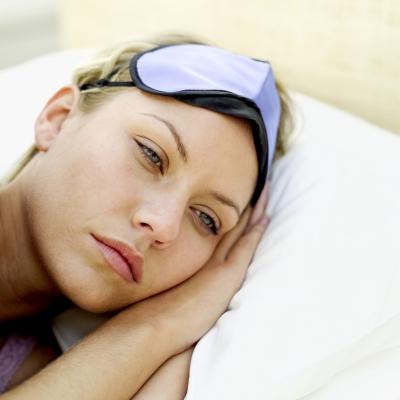Sleep is essential to runners, because this is when your body restores itself. If you're having sleep problems, your running routine might be to blame. Running triggers conditions in your body that can impair sleep. Additionally, the intensity of your workout, and the time during which you run, can also affect your sleep cycle. Learning about the effects of running on sleep can help you get the expert-recommended seven to nine hours of shuteye.

Don't let your running routine keep you up at night. Photo Credit Stockbyte/Stockbyte/Getty Images.

Increase of Cortisol
When you wake up in the morning, the amount of the stress hormone cortisol in your body is at its highest, and over the course of the day, it slowly lowers. In addition to inhibiting your immune system, raising your blood sugar, and promoting the metabolic process of carbs, protein and fat, cortisol increases glucose in your body when you run. Glucose provides energy to your muscles. When your workout is over, cortisol levels can stay elevated for up to nine hours, which can have a negative effect on sleep.
Increase of Body Temperature
Falling asleep is easiest under cool conditions, which includes a low body temperature, and a cool room with a temperature of about 65 degrees Fahrenheit. However, when you run, your breathing gets heavier and your body temperature increases. This increase in body temperature can keep you awake at night, because it can take four to six hours before your temperature goes back down. This means that if you exercise close to bedtime, your elevated body temperature can cause sleep problems.
Vigorous Exercise Intensity
Your running intensity might partly be to blame for your lack of sleep at night. According to the National Sleep Foundation, a moderate exercise intensity, such as that of walking, is more beneficial to getting quality sleep, compared to vigorous-intensity exercise, such as running. Exercising at a moderate pace allows you to fall asleep faster and stay asleep longer. To monitor your intensity, do the talk test. If you can talk, but not sing, you're exercising at a moderate intensity, and if you can only say a few words before catching your breath, you're exercising at a vigorous pace.
Running and Sleeping
In many instances, running is beneficial to sleep, as long as you do it at least four hours before bedtime, so that your body temperature has enough time to go down to a favorable level. If you want to do some exercise before bedtime, do yoga, or some light stretching, which can have a relaxing effect. Running, and exercising in general, also combats symptoms associated with anxiety and depression, which can sometimes keep you up at night. Other ways to get a good night's sleep can be to make sure that the room is pitch dark, to take a warm bath beforehand, and to go to bed and wake up at the same time each day.
www.livestrong.com





No comments:
Post a Comment